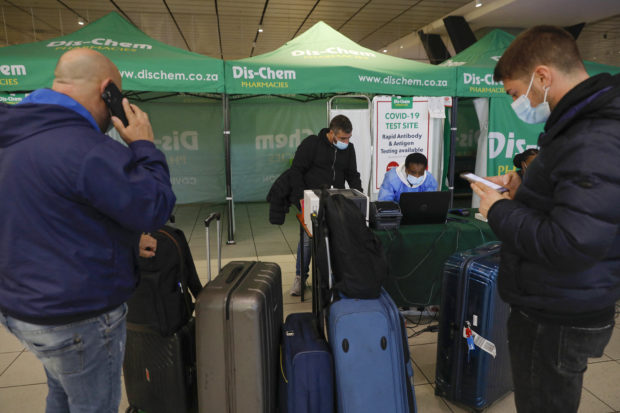What is known so far about new COVID-19 variant Omicron

A healthcare worker assists a traveller to obtain his test results after conducting a polymerase chain reaction (PCR) Covid-19 test at OR Tambo International Airport in Johannesburg on November 27, 2021, after several countries banned flights from South Africa following the discovery of a new Covid-19 variant Omicron. AFP
Origins
It is currently unclear where the variant originated from, but South African scientists were the first to announce the discovery on November 25. By that time cases had been detected in Hong Kong and Botswana. A day later, Israel and Belgium also uncovered the variant.Mutation
Scientists discovered the new variant with a “very unusual constellation of mutations” on November 23. Some of the mutations are already known, and affect transmissibility and immune evasion, but many others are new. It has the “most mutations we have seen to date”, said Professor Mosa Moshabela, Deputy Vice Chancellor of Research and Innovation at the University of KwaZulu-Natal. He said “some of these mutations we have seen before like in Delta and Beta,” but others they have not, and “we don’t know what the combination of those mutations will translate into.” Leading virologist Tulio de Oliveira said there were around 50 mutations overall, including 30 on the spike protein, the focus of most vaccines as it is what enables the virus to enter cells.Transmissibility
The pace at which the new daily Covid cases are increasing in South Africa has left scientists suspecting it may be driven by the transmissibility of the new variant. Although not all are Omicron cases, the daily Covid positivity rate rose this week from 3.6 percent on Wednesday, 6.5 percent on Thursday, 9.1 percent on Friday and 9.2 percent on Saturday, according to official data. “Some of the mutations that are expressed have previously been shown to enable the virus to spread easily and quickly, and because of that we suspect that the (new variant) is going to spread quickly,” said Moshabela. Immunity, severitySome of the genetic mutations shown by the virus include those known to enable the virus to evade immunity. It is unclear though what the impact will be on vaccines. As for the severity of the variant, scientists say it has only come to light this week, giving little time for thorough analysis.
For more news about the novel coronavirus click here.
What you need to know about Coronavirus.
For more information on COVID-19, call the DOH Hotline: (02) 86517800 local 1149/1150.
The Inquirer Foundation supports our healthcare frontliners and is still accepting cash donations to be deposited at Banco de Oro (BDO) current account #007960018860 or donate through PayMaya using this link.